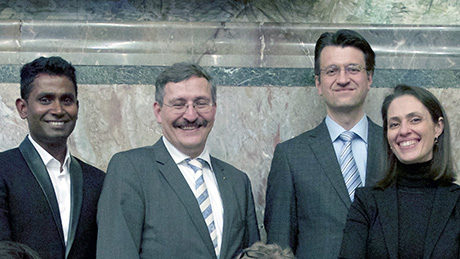Navigation auf uzh.ch
Navigation auf uzh.ch

Many people congregated in the main UZH lecture hall yesterday for a kind of baptism: the presentation of a new open access platform called Matters. Various guests had been invited as “godparents” to welcome the new UZH-born brainchild.
President Michael Hengartner expressed his delight at being present at this historic event. The founder and initiator of Matters, UZH professor Lawrence Rajendran, explained what drives him. UZH professor Adriano Aguzzi described his reasons for supporting Matters from his perspective as a scientist and peer reviewer, and UZH ethics expert Effy Vayena addressed the subject of science communication from an ethical standpoint. Finally, Lukas von Orelli from the Velux Foundation explained what prompted him to give the project financial support.
Lawrence Rajendran, assistant professor of systems biology at UZH, described how it currently takes five or six years before researchers can publish a study. The reason is that scientific journals don’t accept mere data, but always want a story as well. “Data on their own aren’t sexy. Research is only attractive for journals when you make a story out of it.” According to Rajendran, the fatal flaw is that in the meantime important research data remain unexploited – data that could also be interesting for other scientists and drive their research forward.
Now, he said, researchers have Matters, an open-access online platform where they can publish individual findings as well as finished studies. The quality of data is verified in a review process before it goes online. Unlike the large journals, however, at Matters the review process is quick, taking only around two weeks.
Another advantage is that researchers are no longer under so much pressure to publish large quantities of work. Also, the new platform reduces the temptation to manipulate data to make an appropriate story out of the research. In a nutshell, said Rajendran, the new, neutral platform offers many advantages. He also hopes that the fact that data are reviewed anonymously will reduce discrimination against researchers on the basis of their sex or the color of their skin.
UZH prion researcher Adriano Aguzzi is excited about Matters. He believes it’s right to subject interim findings to a brief review before publication, because this avoids the announcement of a glut of data whose scientific value has not been proven.
As things stand at present, a researcher’s fate hangs on the acceptance or rejection of a study. Aguzzi believes Matters will help mitigate the risk that originality goes unrecognized. He got a laugh by projecting on screen a number of fictitious, typical peer reviewer comments on Galileo’s discovery that the earth revolves around the sun.
Review 1, for example: The study is purely descriptive. Even if one accepts that the earth revolves around the sun, the author fails to describe the underlying mechanism. He would have to move the sun and observe the subsequent reaction. Review 2: The study lacks originality (c.f. previous study by Copernicus). Review 3: It is an indisputable fact that the earth is at the center of the universe. Galileo’s work contradicts publications in major jourmals (for example the Bible).
Ethics expert Effy Vayena presented an outsider’s view of the business of science. She pointed out that researchers at universities write articles that in many cases have involved years of research and a great deal of taxpayers’ money. These findings are important for society. The Matters platform, she said, made it possible to publish data without having to package it in a sensationalist story. This makes research transparent and credible.
After the baptism it was time to celebrate.